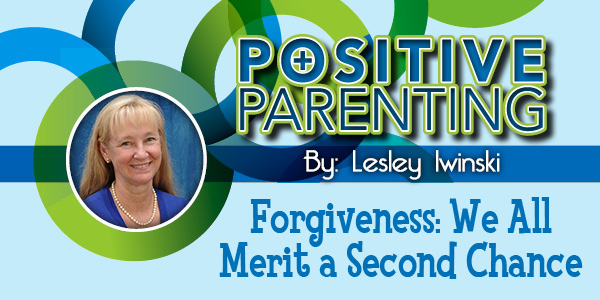Forgiveness: We All Merit a Second Chance
People generally tend to enjoy and appreciate “new beginnings,” especially children. New year, new friend, new shoes…. fallen snow, waiting for footprints and angels like an artist’s blank canvas.
Nowhere is the impact of a new beginning more powerful than after a mistake, a transgression or behavioral outburst.
Think of a time when someone forgave you and gave you another chance. The greater the offense, the deeper was your gratitude – and the greater your desire to do things differently.
You probably felt relief and hope…relief that you were forgiven and hope in yourself.
Much has been made of forgiveness being “a gift you give yourself.”
This is true for adults, but young children are incapable of that level of understanding.
For children, being forgiven is the gift that means they are loved unconditionally and supported while they learn from their mistakes and carry forward the lessons those mistakes provide.
Call it a “clean slate” or “another chance.” It may not seem like a big deal to grown-ups, but it is a very big deal for little people who are learning how the world works.
Whatever a child has done, she can learn what to do to make things right.
Everyone makes mistakes. She has another chance to do a better job. This is an encouraging place to be.
- “Oh dear, you forgot that sand is not for throwing! We have to get out of the sandbox now, but you can try again after lunch.”
- “I know you would like to stay and play with Pete, but you are having a hard time keeping your hands to yourself. We are going home now, and we will see if Pete can come to our house another day.”
Placing limits often provokes cries of sadness and anger from children. As a parent, stay calm, stay the course and stay optimistic.
“You’re upset. I get it. You can try again later.”
Your child gets the message that he did something wrong, that you love him and that he can try again.
Children who don’t experience the encouragement of forgiveness and second chances have a harder time managing their emotions.
It is more difficult for them to improve their behavior because they feel badly about themselves.
After all, it’s hard to have a clear head for learning and a light heart for trying if you feel as though you have no chance of redemption.
“When you forgive, you in no way change the past – but you sure do change the future.” ~ Bernard Meltzer, American radio talk show host.
Dr. Lesley Iwinski is the mother of three grown children, a family physician and owner of Growing Peaceful Families, LLC. She offers classes, workshops and seminars. Info: (859) 333-3053 or
www.growingpeacefulfamilies.com.

